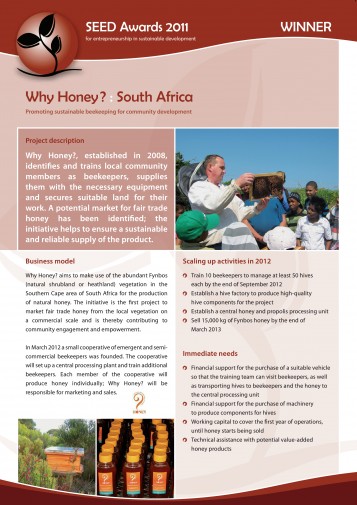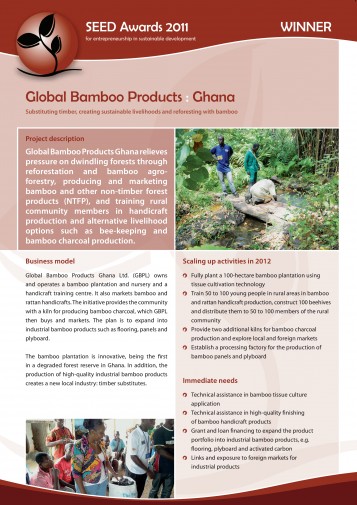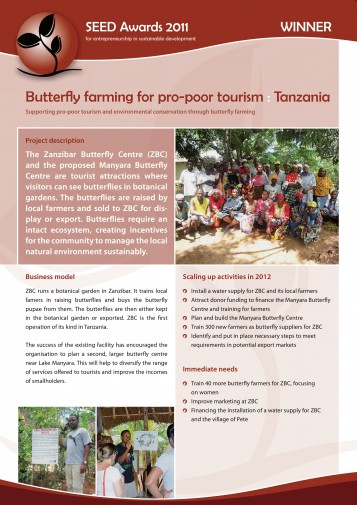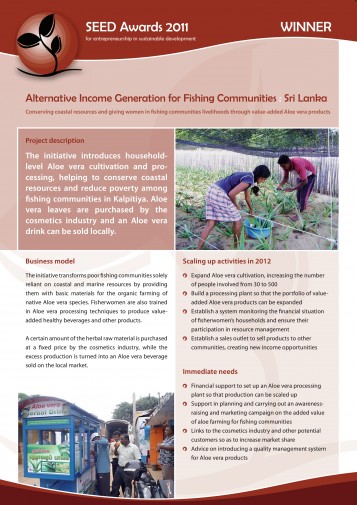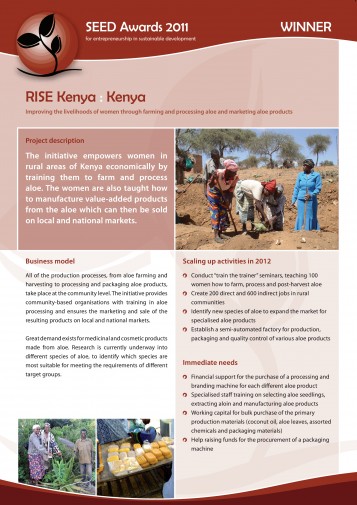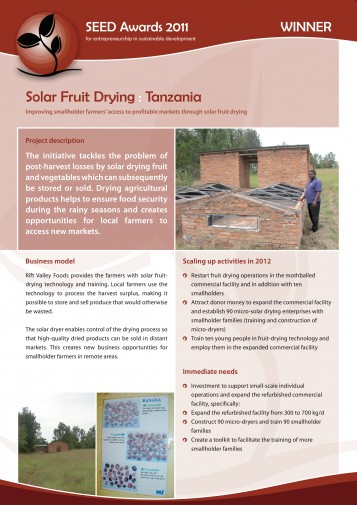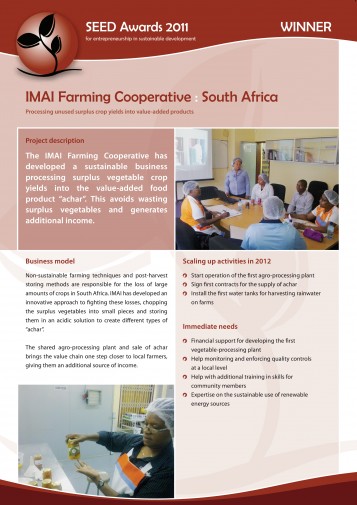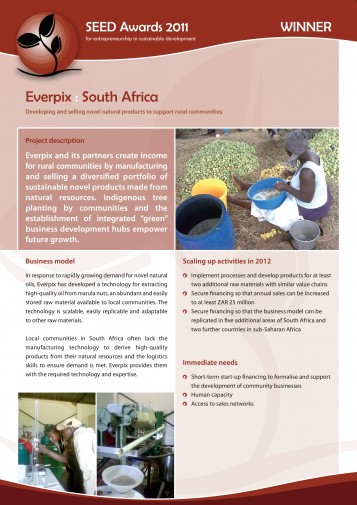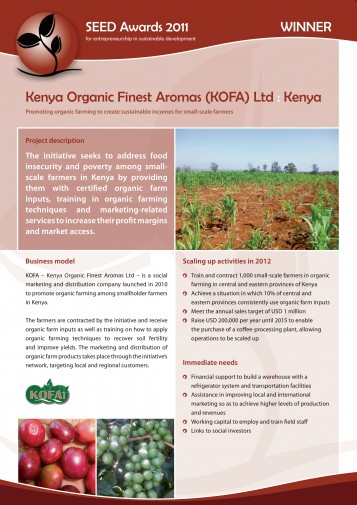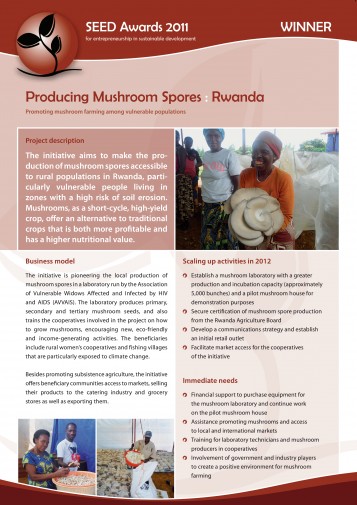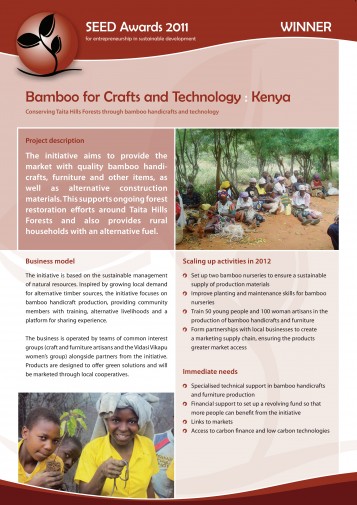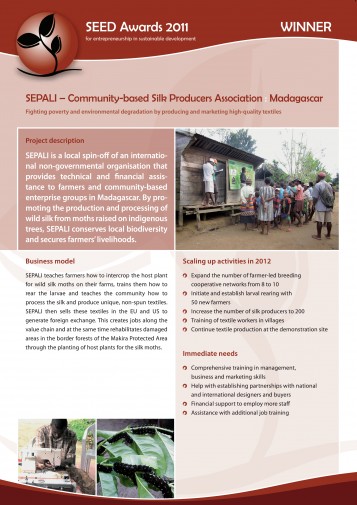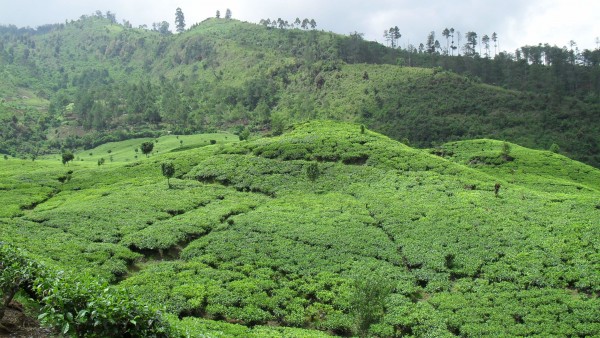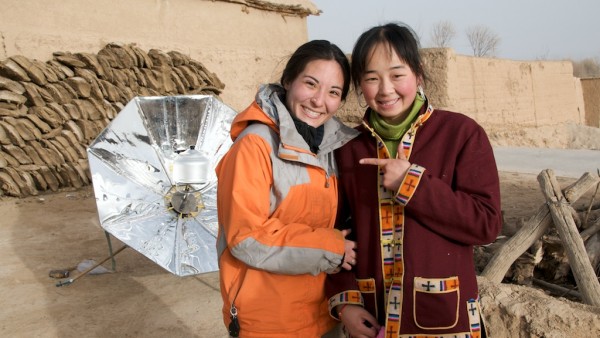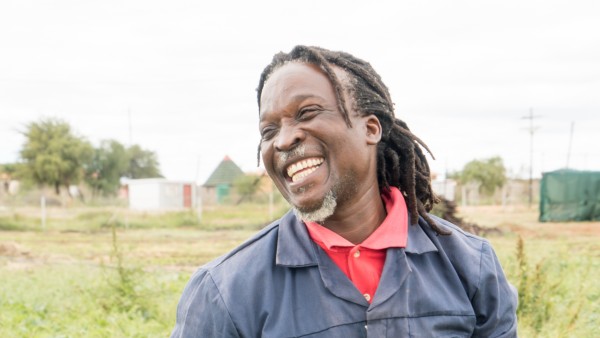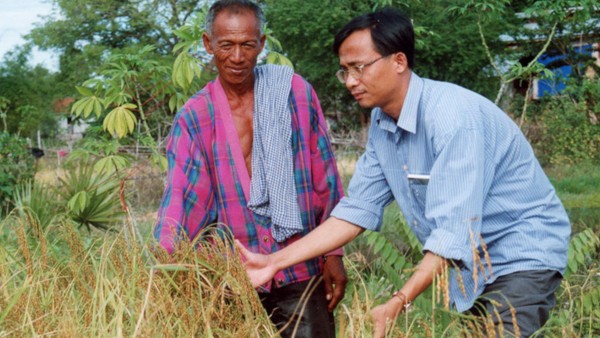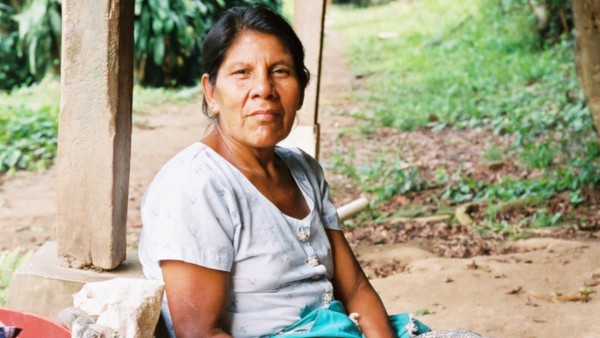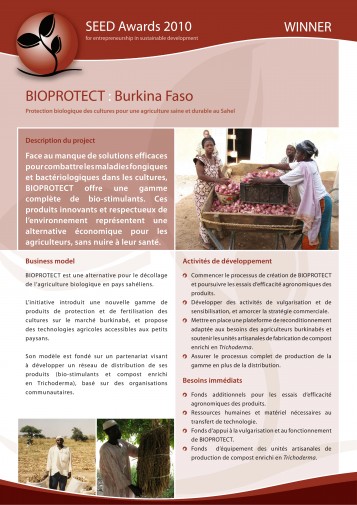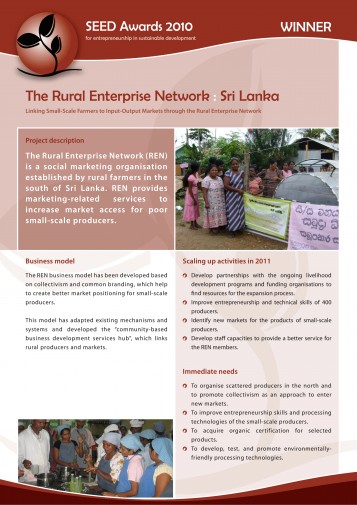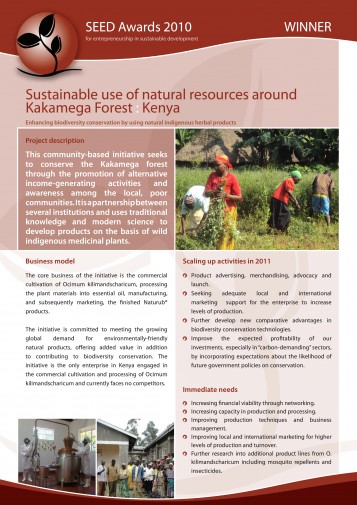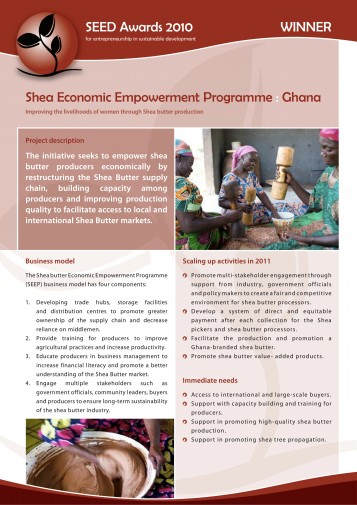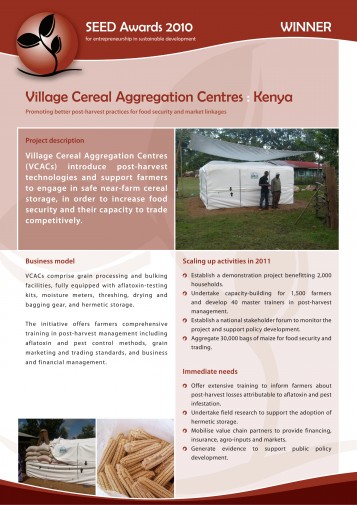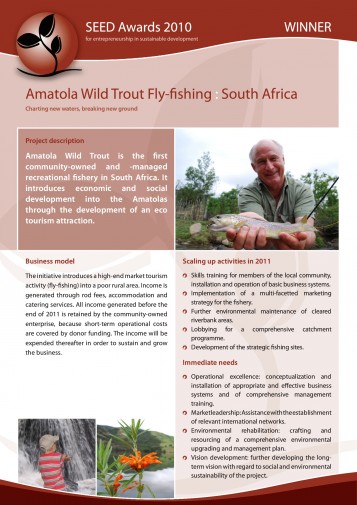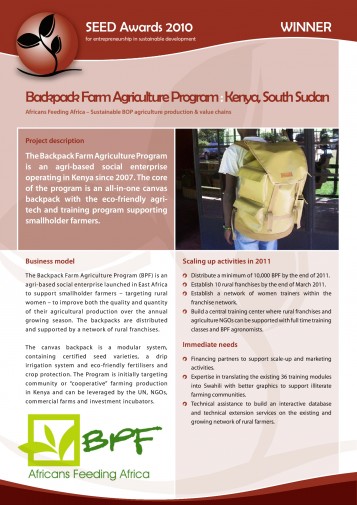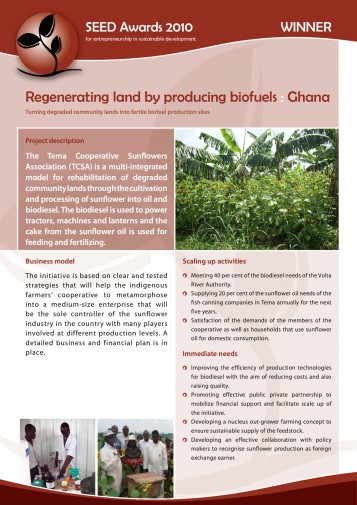Enterprise Brief: Why Honey
Published: 30 August 2011
Why Honey?, established in 2008, identifies and trains local community members as beekeepers, supplies them with the necessary equipment and secures suitable land for their work. A potential market for fair trade honey has been identified; the initiative helps to ensure a sustainable and reliable supply of the product. Read more
SDGs:









Enterprise Brief: Global Bamboo Products
Published: 29 August 2011
Global Bamboo Products Ghana relieves pressure on dwindling forests through reforestation and bamboo agroforestry, producing and marketing bamboo and other non-timber forest products (NTFP), and training rural community members in handicraft production and alternative livelihood options such as bee-keeping and bamboo charcoal production. Read more
SDGs:









Enterprise Brief: Butterfly farming for pro poor tourism and environment conservation
Published: 29 August 2011
The Zanzibar Butterlfy Centre (ZBC) and the proposed Manyara Butterfly Centre are tourist attractions where visitors can see butterflies in botanical gardens. The butterflies are raised by local farmers and sold to ZBC for display or export. Butterflies require an intact ecosystem, creating incentives for the community to manage the local natural environment sustainably. Read more
SDGs:





Enterprise Brief: Community-based, sustainable and commercially viable Aloe vera products as alternative income generation for fisherwomen in Bar Reef Special Management Area in Kalpitiya
Published: 29 August 2011
The initiative introduces householdlevel Aloe vera cultivation and processing, helping to conserve coastal resources and reduce poverty among fishing communities in Kalpitiya. Aloe vera leaves are purchased by the cosmetics industry and an Aloe vera drink can be sold locally. Read more
SDGs:









Enterprise Brief: RISE Kenya
Published: 29 August 2011
The initiative empowers women in rural areas of Kenya economically by training them to farm and process aloe. The women are also taught how to manufacture value-added products from the aloe which can then be sold on local and national markets. Read more
SDGs:







Enterprise Brief: FADECO Trading Co. Ltd.
Published: 29 August 2011
The initiative tackles the problem of post-harvest losses by solar drying fruit and vegetables which can subsequently be stored or sold. Drying agricultural products helps to ensure food security during the rainy seasons and creates opportunities for local farmers to access new markets. Read more
SDGs:







Enterprise Brief: Imai Farming Cooperative
Published: 29 August 2011
The IMAI Farming Cooperative has developed a sustainable business processing surplus vegetable crop yields into the value-added food product “achar”. This avoids wasting surplus vegetables and generates additional income. Read more
SDGs:







Enterprise Brief: Natural tree products and community resource management
Published: 29 August 2011
Everpix and its partners create income for rural communities by manufacturing and selling a diversified portfolio of sustainable novel products made from natural resources. Indigenous tree planting by communities and the establishment of integrated “green” business development hubs empower future growth. Read more
SDGs:







Enterprise Brief: Kenya Organic Finest Aromas Ltd (KOFA)
Published: 29 August 2011
The initiative seeks to address food insecurity and poverty among smallscale farmers in Kenya by providing them with certified organic farm inputs, training in organic farming techniques and marketing-related services to increase their profit margins and market access. Read more
SDGs:







Enterprise Brief: Project for Producing Edible Mushroom Spores
Published: 29 August 2011
The initiative aims to make the production of mushroom spores accessible to rural populations in Rwanda, particularly vulnerable people living in zones with a high risk of soil erosion. Mushrooms, as a short-cycle, high-yield crop, offer an alternative to traditional crops that is both more profitable and has a higher nutritional value. Read more
SDGs:









Enterprise Brief: Promoting Bamboo as a Craft and Technology Application with a View to Conserving Taita Hills Forests
Published: 29 August 2011
The initiative aims to provide the market with quality bamboo handicrafts, furniture and other items, as well as alternative construction materials. This supports ongoing forest restoration efforts around Taita Hills Forests and also provides rural households with an alternative fuel. Read more
SDGs:







Enterprise Brief: SEPALI Madagascar
Published: 29 August 2011
SEPALI is a local spin-of of an international non-governmental organisation that provides technical and financial assistance to farmers and community-based enterprise groups in Madagascar. By promoting the production and processing of wild silk from moths raised on indigenous trees, SEPALI conserves local biodiversity and secures farmers’ livelihoods. Read more
SDGs:







The Green Economy: SEED's activities to help accelerate the transition
Published: 16 August 2011
On 15th April 2011, nearly 200 people gathered in Pretoria to explore the role of social and environmental enterprises in shaping the Green Economy. Read more
SDGs:









From bamboo bikes to biomass briquettes: UNEP unveils SEED Award Winners
Constance Hybsier Source: UN Environment
A novel solar device that turns waste heat into electricity in rural China, a Ugandan business that manufactures stationary from agricultural waste, a bamboo bicycle project in Ghana and a female-run business in South Africa making a hand-held laundry device that saves water are among the 30 winners of the 2010 SEED Awards, the United Nations Environment Programme (UNEP) announced today. Read more
SDGs:











Announcement: Meet the 2010 SEED Winners!
Published: 03 November 2010
The SEED Initiative is thrilled to announce its 2010 SEED Award Winners! From bamboo bicycles to fly-fisheries, from businesswomen's collectives to inspired youth, these entrepreneurs are building a more sustainable world, starting in their own communities. Read more
SDGs:









The System of Rice Intensification (SRI) Global Marketing Partnership: From vision to global outreach
Published: 31 October 2010
One of the first SEED Winners in 2005, the SRI Global Marketing Partnership has become the catalyst for an international enterprise spanning a good number of countries in Africa and Asia. Read more
SDGs:





Catching up with SEED Award winners and finalists: The Maya Nut Programme
Published: 29 October 2010
Back in 2005 the Maya Nut Programme was selected as a SEED finalist for its impact on the lives of women and their families in rural Nicaragua and Guatemala. Read more
SDGs:





Enterprise Brief: Initiative for Promoting and Distributing Bio-Pesticides
Published: 29 August 2010
Face au manque de solutions efficaces pour combattre les maladies fongiques et bactériologiques dans les cultures, BIOPROTECT offre une gamme complète de bio-stimulants. Ces produits innovants et respectueux de l’environnement représentent une alternative économique pour les agriculteurs, sans nuire à leur santé. Read more
SDGs:









Enterprise Brief: Linking Small-Scale Farmers to Input-Output Markets through Rural Enterprise Network (REN)
Published: 29 August 2010
The Rural Enterprise Network (REN) is a social marketing organisation established by rural farmers in the south of Sri Lanka. REN provides marketing-related services to increase market access for poor small-scale producers. Read more
SDGs:







Enterprise Brief: Muliru Farmers
Published: 29 August 2010
This community-based initiative seeks to conserve the Kakamega forest through the promotion of alternative income-generating activities and awareness among the local, poor communities. It is a partnership between several institutions and uses traditional knowledge and modern science to develop products on the basis of wild indigenous medicinal plants. Read more
SDGs:







Enterprise Brief: The Shea Economic Empowerment Program (SEEP)
Published: 29 August 2010
The initiative seeks to empower shea butter producers economically by restructuring the Shea Butter supply chain, building capacity among producers and improving production quality to facilitate access to local and international Shea Butter markets. Read more
SDGs:











Enterprise Brief: Village Cereal Aggregation Centres (VCAC)
Published: 29 August 2010
Village Cereal Aggregation Centres (VCACs) introduce post-harvest technologies and support farmers to engage in safe near-farm cereal storage, in order to increase food security and their capacity to trade competitively. Read more
SDGs:







Enterprise Brief: Amatola Wild Trout Fishery
Published: 24 August 2010
Amatola Wild Trout is the first community-owned and -managed recreational fishery in South Africa. It introduces economic and social development into the Amatolas through the development of an eco tourism attraction. Read more
SDGs:





Enterprise Brief: Backpack Farm Agriculture Program
Published: 24 August 2010
The Backpack Farm Agriculture Program is an agri-based social enterprise operating in Kenya since 2007. The core of the program is an all-in-one canvas backpack with the eco-friendly agritech and training program supporting smallholder farmers. Read more
SDGs:





Enterprise Brief: Biofuel Production in Promoting Sustainable Land Management
Published: 24 August 2010
The Tema Cooperative Sunflowers Association (TCSA) is a multi-integrated model for rehabilitation of degraded community lands through the cultivation and processing of sunflower into oil and biodiesel. The biodiesel is used to power tractors, machines and lanterns and the cake from the sunflower oil is used for feeding and fertilizing. Read more
SDGs:








